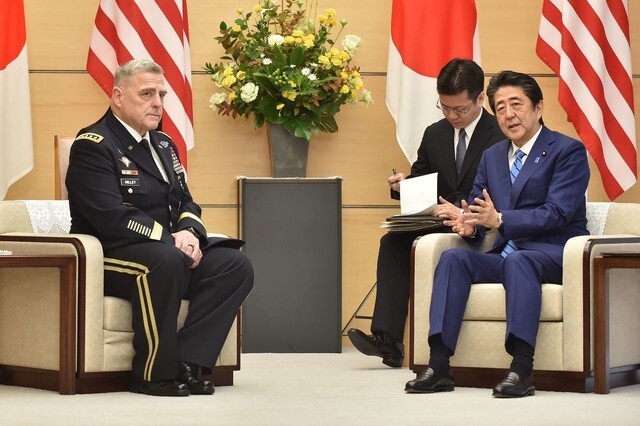hankyoreh
Links to other country sites 다른 나라 사이트 링크
[Editorial] Key to solving GSOMIA issue is within Japanese government, not S. Korea’s

In the countdown to the termination of South Korea and Japan’s General Security of Military Information Agreement (GSOMIA), the US is ratcheting up pressure on South Korea to extend it. US Joint Chiefs of Staff Chairman Gen. Mark Milley arrived in South Korea on Nov. 13; he will be joined by US Defense Secretary Mark Esper on Nov. 14.
While the agenda of the South Korea-US Security Consultative Meeting (SCM), scheduled for the following day, is supposed to deal with assessing joint defense readiness and returning wartime operational control of South Korean troops (OPCON) to Seoul, current circumstances suggest that GSOMIA will be the hottest item on the agenda. The South Korean government needs to stick to its guns and boldly stand up to American pressure about extending GSOMIA.
The US has been pulling out all the stops to pressure South Korea on this issue. David Stilwell, US assistant secretary of state for East Asian and Pacific affairs, pushed hard for extending GSOMIA while meeting with South Korean government officials during a visit last week.
While Milley was touring Japan and South Korea, he described GSOMIA as being “key for security and stability in the region” and stressed unity between South Korea, the US, and Japan. After discussing GSOMIA during a personal meeting with Japanese Prime Minister Shinzo Abe in Tokyo, Milley expressed his hope that a solution would be found before GSOMIA is scrapped.
Robert Abrams, commander of US Forces Korea, also stated publicly that terminating GSOMIA could send the “wrong message” to Korea’s neighbors. In short, not only top officials at the US State Department but also American military leaders have been mobilized for the pressure campaign to extend GSOMIA.
But what the US needs to realize is that it was Japan that provided the rationale for ending GSOMIA. It was Japan that imposed export controls on South Korea on the grounds that Korea is not a country that can be trusted for security reasons. It doesn’t make sense to receive critical security information from such a country. The South Korean government’s decision to end GSOMIA is an appropriate response to Japan’s unjustified economic retribution.
Nevertheless, the US only appears to be pressuring South Korea while keeping its mouth shut about Japan’s provocations. Such behavior not only disregards the courtesy South Korea deserve as an ally but also degrades the value of that alliance.
The South Korean government has already said several times that it’s willing to reconsider its decision to terminate GSOMIA if Japan retracts its unfair export controls. The US needs to give some careful thought to the determination of the South Korean government and public. The key to resolving the GSOMIA issues lies not with the South Korean government but with the Japanese government.
Pressuring Seoul and coddling Tokyo cannot lead to a workable solution; in fact, it will only make the South Korean public take a dimmer view of sharing military intelligence with Japan.
The South Korean government needs to hold to its principles instead of giving way to pressure from the US. If Seoul extends GSOMIA without any change of attitude from Japan, its subservience to the US will harm both its reputation and practical interests.
Please direct comments or questions to [english@hani.co.kr]

Editorial・opinion
![[Column] Will Seoul’s ties with Moscow really recover on their own? [Column] Will Seoul’s ties with Moscow really recover on their own?](https://flexible.img.hani.co.kr/flexible/normal/500/300/imgdb/original/2024/0513/5917155871573919.jpg) [Column] Will Seoul’s ties with Moscow really recover on their own?
[Column] Will Seoul’s ties with Moscow really recover on their own?![[Column] Samsung’s ‘lost decade’ and Lee Jae-yong’s mismatched chopsticks [Column] Samsung’s ‘lost decade’ and Lee Jae-yong’s mismatched chopsticks](https://flexible.img.hani.co.kr/flexible/normal/500/300/imgdb/original/2024/0512/3017154788490114.jpg) [Column] Samsung’s ‘lost decade’ and Lee Jae-yong’s mismatched chopsticks
[Column] Samsung’s ‘lost decade’ and Lee Jae-yong’s mismatched chopsticks- [Correspondent’s column] The real reason the US is worried about Chinese ‘overcapacity’
- [Editorial] Yoon’s gesture at communication only highlights his reluctance to change
- [Editorial] Perilous stakes of Trump’s rhetoric around US troop pullout from Korea
- [Guest essay] Preventing Korean Peninsula from becoming front line of new cold war
- [Column] The state is back — but is it in business?
- [Column] Life on our Trisolaris
- [Editorial] Penalties for airing allegations against Korea’s first lady endanger free press
- [Editorial] Yoon must halt procurement of SM-3 interceptor missiles
Most viewed articles
- 1Seoul’s plan to adopt SM-3 missiles is like wanting a sledgehammer to catch a fly
- 2[Column] Samsung’s ‘lost decade’ and Lee Jae-yong’s mismatched chopsticks
- 3[Correspondent’s column] The real reason the US is worried about Chinese ‘overcapacity’
- 4Korea poised to overtake Taiwan as world’s No. 2 chip producer by 2032
- 560% of young Koreans see no need to have kids after marriage
- 6[Editorial] Yoon’s gesture at communication only highlights his reluctance to change
- 7Yoon voices ‘trust’ in Japanese counterpart, says alliance with US won’t change
- 8Yoon rejects calls for special counsel probes into Marine’s death, first lady in long-awaited presse
- 9S.K.-Japan joint history project to be revived
- 10Former President Roh Tae-woo, mastermind of 1979 military coup, dies at 88